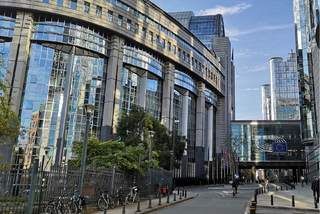
© Pixabay/Norbert Orisko
Net-Zero Industry Act: EU Commission wants to accelerate climate transformation
Strengthening the Production of European Net Zero Technologies
With the legislative proposal, the European Commission aims to "strengthen the resilience and competitiveness of the production of net-zero technologies in the EU and make our energy system more secure and sustainable". To this end, it wants to improve the conditions for net-zero projects in Europe and facilitate investment in the relevant technologies - including solar power, wind energy, batteries, and heat pumps. The aim is also to secure or regain European technological leadership in the areas mentioned.
Acceleration of Approval Procedures
Specifically, the Commission's proposal provides for measures to facilitate investments. These include reducing the administrative burden for specific projects and simplifying approval procedures. In addition, priority is to be given to projects that are essential to strengthen the resilience and competitiveness of European industry. These projects will be subject to even shorter approval periods and streamlined procedures in the future.
In addition, the Commission wants to help CCS-technology (Carbon Dioxide Capture and Storage) for the capture and storage of CO2 achieve a breakthrough. Annual storage capacities of 50 million tons of CO2 are to be created by 2030.
Another measure envisaged by the Net-Zero Industry Act is to improve the skills of a workforce that will ensure the production of net-zero technologies in the EU. Member states are also to be given the option of setting up special flexible regulatory frameworks ("regulatory sandboxes") with which they can test new technologies and stimulate innovation.
A Step in the Right Direction
The Commission's initiative is fundamentally right, as it adds an urgently needed industrial policy perspective to the EU's Green Deal, which has so far focused on climate and environmental policy. By defining the eight net-zero technologies, the Commission rightly addresses the need to ensure sufficient industrial capacities to produce these technologies so that the energy and climate turnaround can succeed.
Permitting Processes as an Obstacle to Climate Transformation
Streamlining and accelerating approval procedures is a particularly important measure here. Up to now, we have experienced all too often that planning and approval procedures delay the transformation of industrial companies on the path to climate neutrality. Long procedures, time-consuming preparations for permit applications, and a lack of personnel in authorities and companies alike are the main causes. Behind this are not only structural problems and complex national procedural law, but also European law. The basis, for example, for environmental requirements in approval procedures or extensive reporting obligations of companies are European water, nature conservation or immission protection laws.
Climate Transformation of the Entire Industry Requires Process Acceleration for All
However, this does not only apply to the eight technologies proposed by the Commission. A climate-neutral European industrial continent will only emerge if we quickly tackle the transformation of industry. This applies to all industrial plants from a wide range of sectors. Europe must not become a two-speed continent here. To achieve the climate protection targets, the entire industrial sector must quickly implement the necessary transformation measures.
Only with the products, innovations and technical progress of German industry can the climate turnaround succeed. Sectors such as the steel, chemical and cement industries, as well as energy production, require extensive transformation measures, for example to produce hydrogen and the use of gas and electricity as alternative energy sources. Their products - steel, cement, plastics, and basic chemical products - are essential for climate neutrality in all areas, for example for the construction of wind turbines or photovoltaic plants. This will require investment running into hundreds of billions.
In the legislative process, the Council and the European Parliament must now decide how the Net Zero Industry Act can be aligned with this larger goal. Companies in Europe need a perspective quickly so that they can make the necessary investment decisions without delay.



